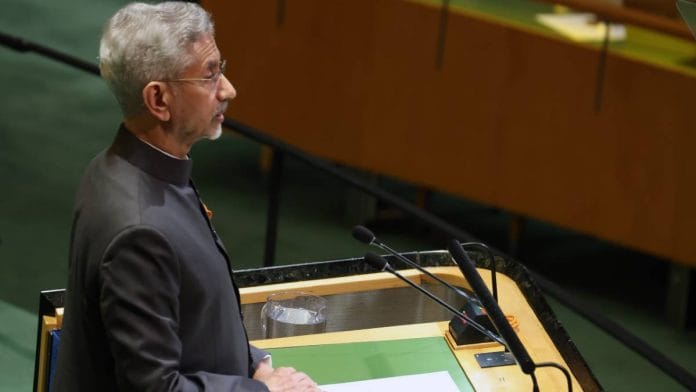New Delhi: External Affairs Minister S. Jaishankar Saturday took aim at Pakistan’s history of support for terrorism, while highlighting India’s right to self-defence and calling out “better-off” countries for their double standards over access to resources at the United Nations General Assembly (UNGA).
“Countering terrorism is a particular priority because it synthesises bigotry, violence, intolerance and fear. India has confronted this challenge since independence, having a neighbour that is an epicentre of global terrorism. For decades now, major international terrorist attacks are traced back to that one country,” Jaishankar said, without naming Pakistan directly through the course of his speech.
“UN’s designated lists of terrorists are replete with its nationals. The most recent example of cross-border barbarism was the murder of innocent tourists in Pahalgam in April this year. India exercised its right to defend its people against terrorism and brought its organisers and perpetrators to justice,” he added.
Jaishankar’s speech was very different from that of Pakistani Prime Minister Shehbaz Sharif, who a day earlier declared “victory” over India in the conflict in May, while asserting that Islamabad is seeking to “win” peace as well, and called for a plebiscite in Jammu & Kashmir.
Sharif, who thanked US President Donald Trump multiple times in his address for ending the “war”, also praised Army Chief Asim Munir and the Pakistan military for its response to New Delhi’s strikes against terrorist complexes in the nation.
Jaishankar highlighted India’s right to self-defence with regards to terrorist attacks, before calling for the reformation of the United Nations system and highlighting other global issues.
His speech at the 80th session of the UNGA came on the fifth day of the general debate. The address, which was made during the morning session, came after a number of international leaders had already spoken during the preceding four days of debate, including Sharif, Trump, Chinese Premier Li Qiang and Russia’s Foreign Minister Sergey Lavrov.
Earlier Friday, Indian diplomat Petal Gahlot delivered a rebuke to Sharif’s speech, condemning the Pakistan PM for “absurd theatrics” while highlighting Islamabad’s role in sheltering Osama bin Laden for a decade.
Gahlot also raised Islamabad’s defence of The Resistance Front, a terrorist group and offshoot of the Pakistan-based LeT, which took credit for the Pahalgam terrorist attack, before back-tracking days later.
Also Read: From Bajwa to ‘Munir Doctrine’ & peace in Kashmir—why India believes Pakistan greenlit Pahalgam
‘Sanctimonious lectures’
Jaishankar took aim at the UN and the prevailing global situation, highlighting how the better off countries in the world discriminated against the rest during the COVID-19 pandemic regarding access to vaccines.
He also pointed out that since the Russia-Ukraine war began in 2022, the western nations “insulated” themselves while offering nothing but “sanctimonious lectures” to the rest of the world, especially on energy security.
“When a ‘once in a century’ pandemic hits us, we saw open discrimination in access to vaccines and to travel. Energy and food security have been the first casualties of conflict and disruption, especially since 2022. Better-off societies insulated themselves by having the first call. The resource-stressed ones scrambled to survive, only to hear sanctimonious lectures thereafter,” Jaishankar said.
India has been consistently criticising what it says are global “double standards” over the purchase of Russian energy. New Delhi has ramped up its purchases of Russian crude since 2022, with its total imports of energy from Moscow touching $56 billion in the last financial year. Jaishankar declared that India will always “maintain its freedom of choice” when it comes to global ties during the address.
However, New Delhi has come under pressure from the US in particular over these purchases, with the US imposing a penalty tariff of 25 percent on exports from India, in addition to its baseline levy of 25 percent. With a total tariff rate of 50 percent, India faces one of the highest rates for any trading partner of the US.
“When it came to trade, non-market practices gamed rules and regimes. The resulting concentration exposed the world to leveraging. On top of that, we now see tariff volatility and uncertain market access. As a result, de-risking is a growing compulsion; whether from limited sources of supply or over-dependence on a particular market,” Jaishankar said.
In the face of the “penalty” tariff, India has said it will maintain a policy focussed on energy security and buy from the global markets accordingly. Moscow’s oil is capped at a price lower than the prevailing price by the G7 nations, in an attempt to hurt Russia’s revenue and thereby impact its warring capabilities.
The Indian external affairs minister further called for the countries of the world to “co-exist” and “enrich one another”.
“This will only happen when we resist political interference and economic pressures, when narratives are free of prejudice, when double standards are abjured and when pluralism is truly appreciated,” he said.
(Edited by Nida Fatima Siddiqui)
Also Read: Pakistan needs a different kind of Islam. One that doesn’t hate Hinduism






